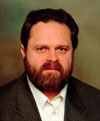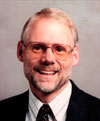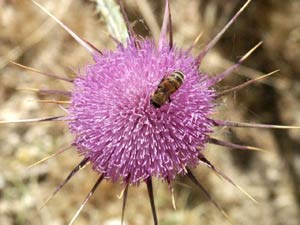Weekly Reports from Jordan
Choose Year: or Choose week
Peace, Trickle and Love
Larry G. Herr and Douglas R. Clark
Peace.
 Doves coo in the Cyprus trees outside my window in the early morning as I gently awake. The wind sighs through the pines between the two dormitories. In the distance a family of farmers scythes their rich wheat field. The barely audible hum of traffic on the Na'ur Road at the top of the hill behind me reminds me I am in the city, but the real world around me speaks much more softly. Peace.
Doves coo in the Cyprus trees outside my window in the early morning as I gently awake. The wind sighs through the pines between the two dormitories. In the distance a family of farmers scythes their rich wheat field. The barely audible hum of traffic on the Na'ur Road at the top of the hill behind me reminds me I am in the city, but the real world around me speaks much more softly. Peace.
Am I indeed in the Middle East? My flight itinerary tells me I should be in Amman, Jordan. But my newspapers tell me I should find violence, hatred, terrorism. Instead, a young boy of six or seven years, seeing me pass, yells out his window in broken English, "Welcome, Jordan!" I wave, we exchange smiles of encouragement and hope, and I think to myself, "Wow, isn't it great to be back in Jordan, my second home!"
All the Palestinian leaders and gatemen at the Amman Training College where we have our camp, display a similar joy to see us again. Even the Palestinian proprietor of the nearby felafel shop, greets me with a huge smile and informs me that all Americans are welcome. I quickly tell him I am from Canada and his smile grows perhaps slightly larger, but it doesn't seem to make any difference. I feel the same old joy of human fellowship I find everywhere among the people of the Middle East. The distinct feelings of rest and security we experience make a mockery of media presentations back home.
It's good to be back in Jordan. Peace.
Trickle.
![Resting after moving supplies down from third-floor storage room - [from left] Carmen, Doug, Larry, Denise, Julie. Photo by Larry Murrin)]](/umayri/editor/images/weeklyreports/2002/week1/juneeve.jpg) Our staff is gradually trickling into camp. Doug and Carmen Clark have been in Jordan since December doing research. As I write, Object Registrar Carmen is practicing her oud, a Middle Eastern instrument from which our lute (and subsequently the guitar) derived. It's often used to play Arab classical music (we won't mention that it's also used to accompany belly dancing). The soft strains of a haunting melody drift into the computer room with the breeze. Co-Director Doug has done a monumental job preparing everything for the dig. Our dig permit was waiting for us when we went to the Department of Antiquities office on Sunday. Smooth sailing.
Our staff is gradually trickling into camp. Doug and Carmen Clark have been in Jordan since December doing research. As I write, Object Registrar Carmen is practicing her oud, a Middle Eastern instrument from which our lute (and subsequently the guitar) derived. It's often used to play Arab classical music (we won't mention that it's also used to accompany belly dancing). The soft strains of a haunting melody drift into the computer room with the breeze. Co-Director Doug has done a monumental job preparing everything for the dig. Our dig permit was waiting for us when we went to the Department of Antiquities office on Sunday. Smooth sailing.
Five Canadians arrived very early Thursday morning, June 13, from Calgary: Co-Director Me, Pottery Registrar Denise Herr, Computer Coordinator Larry Murrin, James Hanson (all the above are from Canadian University College), and Field H supervisor Julie Cormack from Mount Royal College in Calgary. Together with the Clarks they supervised 12 local workers as they schlepped all the dig supplies from the storeroom on the third floor. Larry M has our computer system set up and running, including internet and email access from the ATC computer lab just across from the canteen. Denise has unpacked all the lab supplies. I have purchased the daily bread-hot, fresh khoubez tabun from a local bakery. Julie is gradually becoming acquainted with Field H while diligently learning as many Arabic words as she can. James has kept us going with miscellaneous help on many fronts.
On Sunday the trickle grew to a small stream. Field K supervisor Ela Dubis arrived sometime in the middle of Saturday night and, not being able to get into the locked buildings, slept on one of the benches in the handyman area between the dorms. She will spend the summer working on the pottery found at the dolmen during past seasons. Field B supervisor Kent Bramlett appeared on Sunday afternoon and five others arrived Sunday night: Dick and Kate Dorsett (father and daughter from Tacoma, WA), Tony Sears, Ingrid Wang (both from Wesley Theological Seminary in Washington, DC-students of David Hopkins), and Don Mook from Duluth MN. Toward the end of the day, Janelle Worthington and Nicole Murphy (both from Walla Walla College) arrived from Petra where they had spent a few days.
On Monday evening, as several of us were enjoying the fresh evening breeze in the courtyard, a cab arrived carrying the shaved head (the rest of him was there, too) of Jonathan Francisco from Andrews University. We'll make sure he wears a hat so we won't have to call him "Red Dome."
Tuesday morning we woke up to the voice of Dean Holloway outside our window exhorting Don Mook to hurry up and get the coffee samovar going. Dean seems to enjoy the fact that his former teacher, John Lawlor (who is on "sabbatical" from Field A for one season), won't be here this season. Dean thinks this will give him unbridled freedom to do whatever he wants! At some point during the day, Gayle Broom from Walla Walla College sneaked in and appeared at supper. That evening veteran Umayrite from near Seattle, WA, Mary Boyd, wearing purple as usual, arrived with John Raab from the University of Dubuque Theological Seminary and Franke Zollman, a pastor from Ohio. Sometime in the middle of the night Wendell Bowes from Northwest Nazarene University appeared. He didn't even bother to go to bed. We hope he will continue his great tradition of earlier seasons and find thousands of interesting bones from what is left of the early Iron I refuse pit east of our four-room house in Field B. Jennifer Groves from Andrews University also arrived during the night and immediately began her research on a comparison of the late Iron II pottery of Jalul and Umayri. She hopes to make this a major part of her doctoral dissertation at the University of Arizona.
Howard Munson from Walla Walla College arrived during our internet session on Wednesday (virtually everyone in camp was there plugging away at email messages). He was introduced there, but, because everyone was so intently studying the screens in front of them, we felt we needed to introduce him again later at supper! The last arrivals came late Thursday night: Field L supervisor David Hopkins along with one of his students Ruth Kent, both from Wesley Theological Seminary.
One of the great events of the week took place on Tuesday. It was the first use of the ATC computer lab for our internet and email access. Allowing us to access cyberspace from 25 new Pentium 4 machines, the high-speed connection was made possible by funds raised by MPP--Umayri and installed only a week before we arrived. Thanks go to Doug for organizing and following through with this gift to ATC. We have tentatively scheduled computer time from 3:00 to 4:30 each day with pottery washing and reading beginning afterwards. How our lives are changed!
Wednesday saw the beginning of orientation. As if jet lag wasn't enough, we were zapped with seemingly non-stop speeches and instructions, including introductions, welcomes by local officials, lectures on social customs on the dig and in Jordan, how to take showers in water-strapped Jordan, dig assignments, review of the dig manual (yawn), what to wear, how to avoid intestinal disorders, etc., etc.
The cooks spent Saturday on a massive cleanup of the kitchen prior to beginning work for us on Sunday. This year we have taken on a local cook, Abu Faisal, who first came to Amman over 50 years ago from Palestine. He keeps talking (and talking) about Amman when it was a small town of a few thousand people. He carries with him a strong sense of history, having cooked for the late King Hussein.
Love.
In Jordan, peace and archaeology trickle into love. When four of us spent a late afternoon and early evening at the site, discussing the intricacies of the stratigraphy of Field H, we saw something that brought our overly practical discussion to a thoughtful pause. A young man and woman had chosen the roof of our partially-reconstructed Iron I four-room house as the location for their (rather discreet) courtship. The sun was setting, the breeze was softening, and the gently percussive sounds of sheep and goats returning from the fields rose and fell in the distance. It was a time for love. Our young couple, probably in the post-engagement courting period of their relationship, seemed to receive sustenance from the stimuli around them, including the ancient ruins as they stood on the roof of the house and gazed toward the setting sun, drinking in the magic of the place and of each other. We watched them for a short time, then returned to our discussion. Peace... . Love... Archaeology... It's good to know that these ancient stones echo not only with the sounds of our picks and trowels, but also with the forces and traditions of the past and the hopes of the future.
New Beginnings ... Again
 The 2002 season of the Madaba Plains Project excavations at Tall al-`Umayri, Jordan, is officially underway. We have begun ... again. Three days of orientation are behind us - Wednesday at ATC, Thursday visiting the MPP sites of `Umayri, Hisban and Jalul, and Friday hitting the tell just before sunup on the longest day of the year. It's great to start something important like an archaeological expedition, even if this is the ninth season at `Umayri. Along with the returning veterans, there is new blood among us (as the substantial population of mosquitos knows well - although their numbers [the mosquitos] have suffered significantly since Carmen somewhat hesitantly purchased a nifty little racquetball-kind-of-racquet-gizmo which operates on two double-A batteries and fries those suckers on contact, an amazing sight to behold, even in the dark where they set off a veritable fireworks display across the face of the racquet).
The 2002 season of the Madaba Plains Project excavations at Tall al-`Umayri, Jordan, is officially underway. We have begun ... again. Three days of orientation are behind us - Wednesday at ATC, Thursday visiting the MPP sites of `Umayri, Hisban and Jalul, and Friday hitting the tell just before sunup on the longest day of the year. It's great to start something important like an archaeological expedition, even if this is the ninth season at `Umayri. Along with the returning veterans, there is new blood among us (as the substantial population of mosquitos knows well - although their numbers [the mosquitos] have suffered significantly since Carmen somewhat hesitantly purchased a nifty little racquetball-kind-of-racquet-gizmo which operates on two double-A batteries and fries those suckers on contact, an amazing sight to behold, even in the dark where they set off a veritable fireworks display across the face of the racquet).
 The first day in the field witnessed volunteers and veterans beginning to realize the bountiful results of rainfall above the annual national average - thistles galore. The range and variety of these thorny assault weapons of the earth are incredible, if not only for their height (some over a prickly meter high), breadth (some sharply encompassing nearly a city block it seems) and the carpet coverage of low-down toe-pokers, but also incredible for their beauty. Many of the thorns here bear extremely beautiful and often blue or purple blossoms and stems, especially early in their growth patterns, as the accompanying photos demonstrates.
The first day in the field witnessed volunteers and veterans beginning to realize the bountiful results of rainfall above the annual national average - thistles galore. The range and variety of these thorny assault weapons of the earth are incredible, if not only for their height (some over a prickly meter high), breadth (some sharply encompassing nearly a city block it seems) and the carpet coverage of low-down toe-pokers, but also incredible for their beauty. Many of the thorns here bear extremely beautiful and often blue or purple blossoms and stems, especially early in their growth patterns, as the accompanying photos demonstrates.
 Along with shrieks of delight over discovery of the thorns, came rising clouds of dust as excavators began to clear the ground in preparation for excavation. Friday saw diggers from all Fields returning to camp made up with a brown patina of dust (somewhere near 5YR/4/2 in the Munsell Color Chart). Not to worry, as our first second-breakfast of the season provided plenty of watermelon, freshly slaughtered and shared among the group in this daily ritual along the northern escarpment of the tell.
Along with shrieks of delight over discovery of the thorns, came rising clouds of dust as excavators began to clear the ground in preparation for excavation. Friday saw diggers from all Fields returning to camp made up with a brown patina of dust (somewhere near 5YR/4/2 in the Munsell Color Chart). Not to worry, as our first second-breakfast of the season provided plenty of watermelon, freshly slaughtered and shared among the group in this daily ritual along the northern escarpment of the tell.
Another kind of new beginning graced our season this summer, new for us and for ATC. As already mentioned, there has been installed, as a result of a generous grant from MPP-`Umayri and many individual donations from our friends, a new leased line, providing high-speed internet access to the campus computer center, replacing two regular phone lines. For dig personnel, accustomed to long lines outside the room housing the one (older, more decrepit) computer dedicated to email, access to the center with 25 new machines, all connected to the high-speed line, we have taken a quantum leap forward. If one looks around the campus and there is no one in sight, it is either quiet time or the computer center is open for its one or two hours per day.
But for ATC, this means much more. Now the Palestinian vocational students who attend here will be much better prepared for the computer world which more and more characterizes future places of employment. From the United Nations Relief and Works Agency letter of appreciation we received: "This donation will enhance the functions of the Centre which is used by Palestinian trainees and students at Amman Training Centre. This facility will give our students greater opportunity to become familiar with the Internet and its functions. I seize this opportunity to extend my appreciation to all members of the Madaba Plains Project team for their continuous and positive cooperation with the UNRWA staff at the Amman Training Centre." Signed by William Lee, Director of UNRWA Operations, Jordan.
Our thanks to everyone who has helped make this new beginning possible - and further donations are certainly welcome to help cover the monthly fees of its use, beyond the hardware and annual connection costs ($2300) which we donated. Email me at dclark@index.com.jo with any questions.